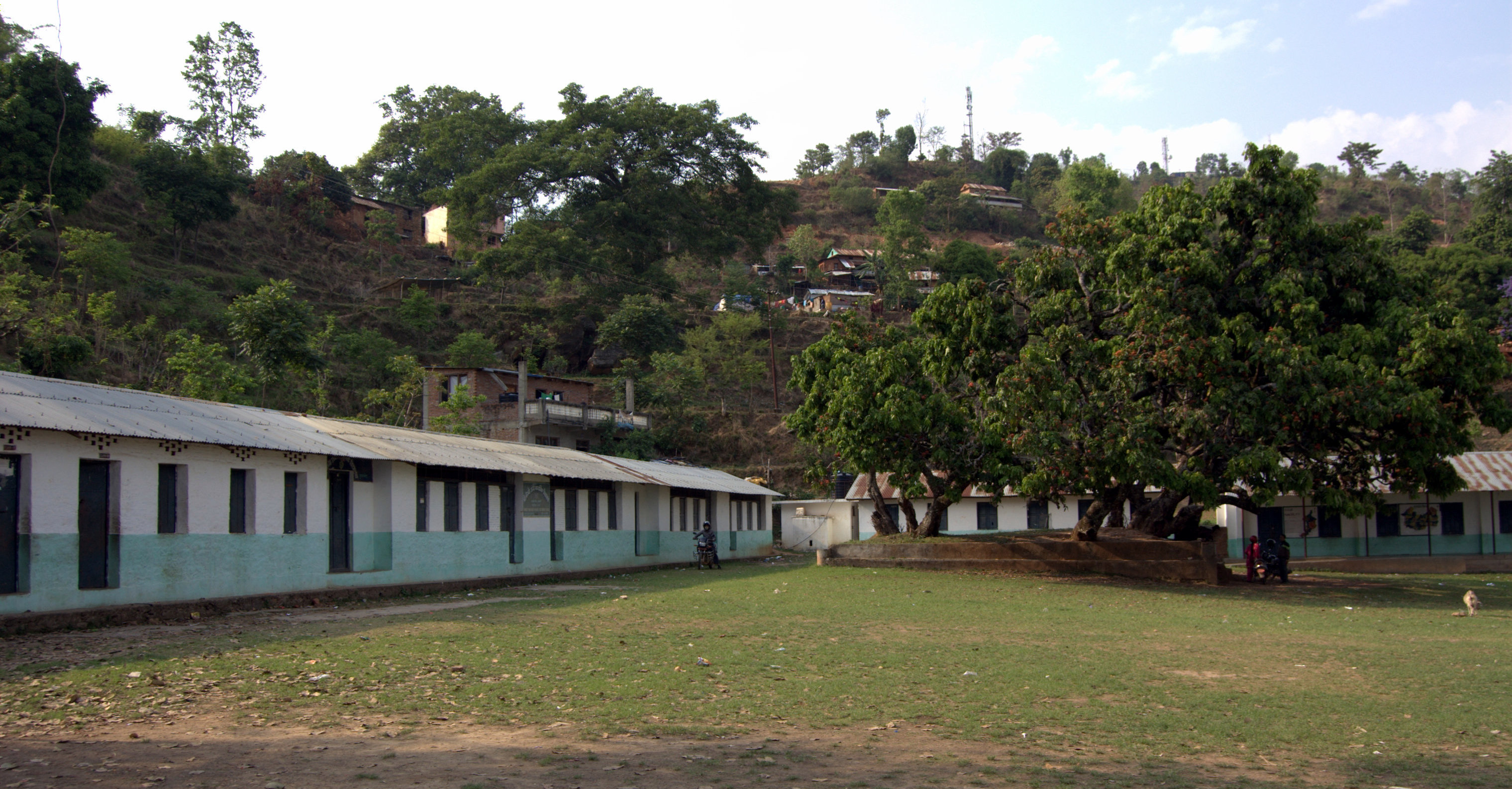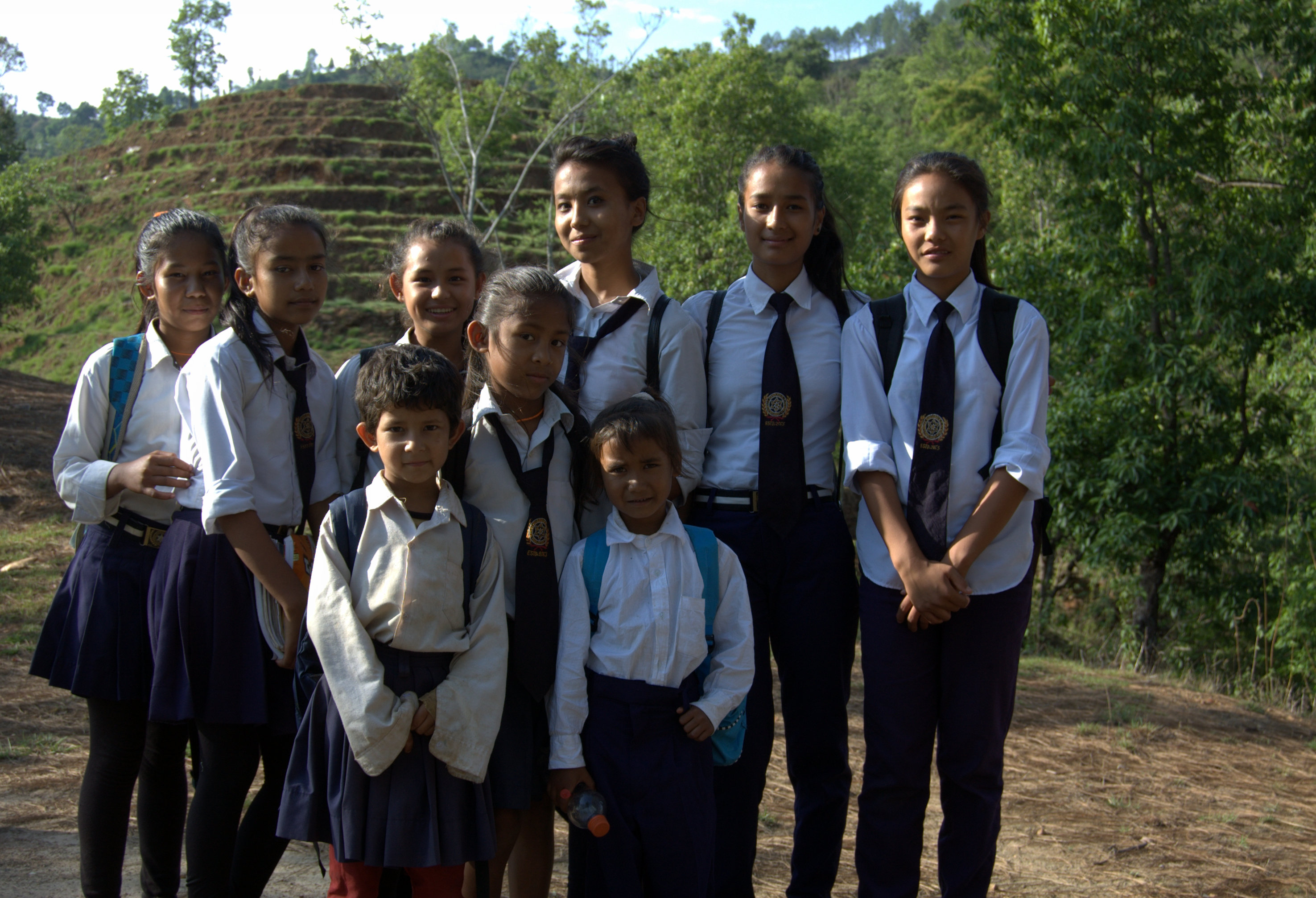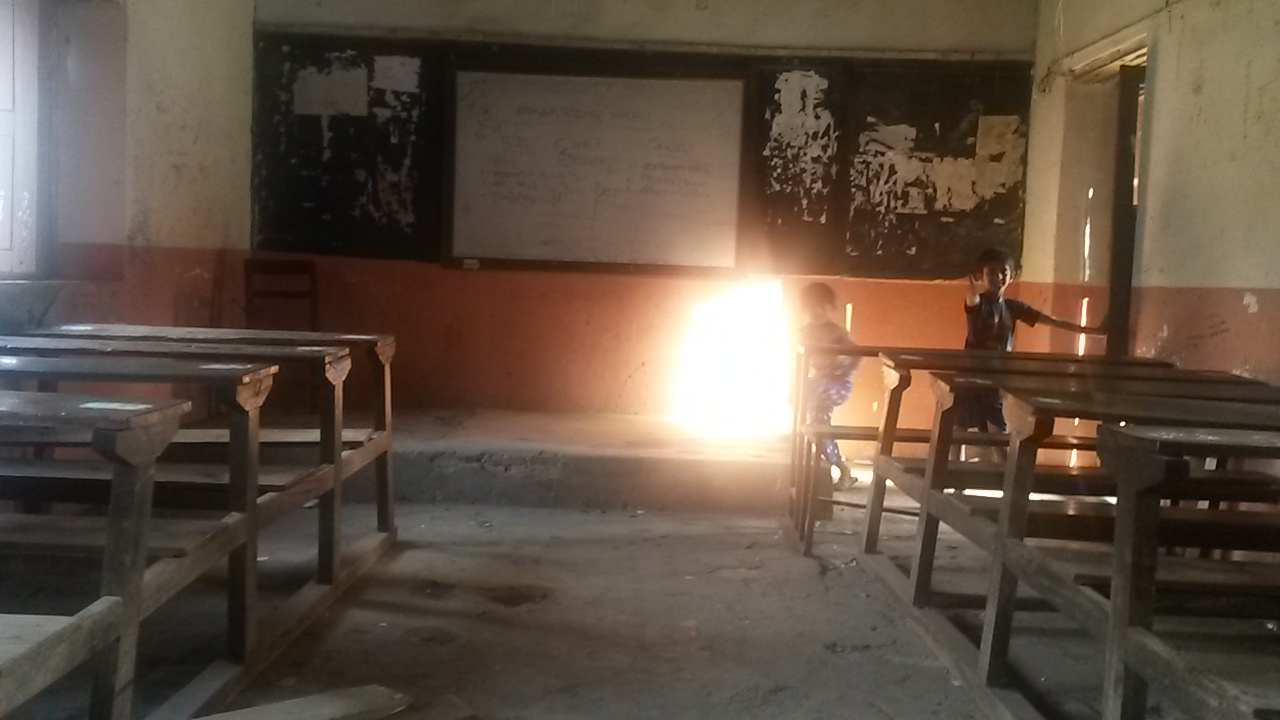Every day I teach four 45-minute classes at the local public school; the education system is very different than that of the US. I consider it a huge honor to have the opportunity to teach these kids. My students walk for up to 2.5 hours one way to get to school. In Nepal nationally, 10-15% of kids never set foot in a school, and of those that do, roughly 20% of boys and 8% of girls will graduate from 10th grade (source). Most of my classes have around 80 students, with more boys than girls.
I teach 11-15 year olds (6, 7, 8, and 9th grades) English and cultural studies. Each class meets every day except Saturday for 45 minutes. The students are generally very well-behaved, but with 80 students cramped together in a hot classroom (they sit 5 to a bench) it’s very difficult to get all of their attention. The rooms are also divided only by tin sheets that do not go all the way up, so we have to deal with competing noises from other classrooms. They do not have access to vision exams or glasses, so many of them cannot see the board, which is another huge obstacle.
The kids always show a ton of respect for teachers, sometimes giving out flowers and fruits in the morning, and always addressing us as “Respected Teachers.” I’ve learned to hang out outside the classroom, because if I enter before a student, they have to interrupt me to ask permission to enter. When a teacher enters a classroom, the students all stand and say, “Good morning, Respected Teacher.” Then, the teacher is supposed to say, “Sit down, class,” and they respond, “Thank you, Respected Teacher.” I’ve tried to explaining to them that I’d rather we didn’t waste time doing that, but it’s so ingrained in them that it’s proven impossible to get them to stop.
Only 10% of secondary-school teachers are female nationally, and there definitely is a huge discrepancy with how my fellow teachers view me. In the morning, the men go around shaking each other’s hands while ignoring the women. They are often extremely surprised to hear that I am a college graduate and have some teaching experience. The “extra” work I put in, lesson planning, home visits, extra classes, has also seemingly taken a lot of the staff by surprise. I would guess on average, teachers only come to class 80% of the time. When they do show up, they typically simply open the textbook to the next page, and read what’s written there and the students are expected to memorize it. Trying to introduce games and songs has been a little bit of a challenge, but once everyone understands that there is learning happening, it’s been well received. This isn’t to disparage the teachers, my co-teachers all truly do want to see the students succeed and graduate.
One major challenge that’s come up is the use of physical punishment. My co-teachers use a lot of corporal punishment. It’s typically twisting their ears or whacking them with the textbook for minor infractions (talking out of turn or not paying attention) but escalates to lifting kids out of their seats by their hair or hitting them with a large stick for more serious infractions. While I obviously would never use any sort of physical punishment, I’m powerless to stop the other teachers. I try to educate them in my personal beliefs and the research that guides those beliefs, but they are certified teachers (I’m not) with many years of teaching experience (all of my co-teachers have taught for at least 15 years). I need to be respectful and understanding of their culture. When the kids realized I wasn’t going to use corporal punishment, I did have a little bit of difficulty with behavior for a few days, but it settled back down fairly quickly. It was tricky to navigate, because I’m their only female teacher, and I also am their only teacher that doesn’t use physical discipline, so there are a few different issues at play.
I love teaching; I love the expression on the kids’ faces when they get it. Here are a few of my favorite stories:
Cleaning up
One morning, I was told first period was cancelled so the students could clean the classrooms, which was supposed to teach them responsibility. I was curious if the boys would participate or just make the girls do all the work, so I went over to where the students were cleaning to observe. What I saw was the kids (primarily girls) collect the trash in the waste baskets, then walk to the edge of the school, where there’s a fence. They would then simply dump the trash on the other side of the fence, for whoever lived on that property to deal with.
Class is cancelled
School gets cancelled almost every week for one reason or another: one day it was cancelled because it was the big tree in the school courtyard’s birthday. I was warned that sometimes I would just show up and learn there was no school that day. And while that hasn’t happened yet (so far, I’ve been in the loop enough to hear the night before), one morning I was teaching, and the “school mother” who performs basic custodial duties interrupted the class to inform us that school had been cancelled because not enough teachers had shown up (at least 30% of teachers must show up for school to be held). I said that was fine, but I wanted to finish out the lesson (since the kids had walked over two hours to get to school, I wanted to at least let them have one class). So I continued teaching as the school mother went to inform the other teachers. I saw all the other classes let out, but don’t really give it any thought. As I continued teaching, though, the school mother came back in and started boarding up the windows and wiping down the board (that I was using). She reiterated that school was cancelled immediately, and when I turned back around to my students, they had already started leaving.
Adjective Woes
I was co-teaching a class where the students were learning adjectives related to humans. The textbook provided a massive list and some drawings to help the kids learn. I had each student go up to the front of the class and describe themselves with the new adjectives. One boy walked up to the front and proudly declared, “I am fat with dull eyes.” The teacher was delighted, and had the class repeat, “He is fat with dull eyes.” I didn’t want to correct content, so for the rest of the 45 minute period, everyone used his preferred descriptors. Every time i see him, I still think of his “dull eyes.”
Carry a Big Stick
I was teaching my most difficult class-seventh grade-and the boys were just having a really hard time staying focused. As soon as I would get one group settled down, and another group would start play fighting or making paper airplanes or taunting monkeys out the windows. The girls, meanwhile, were all sitting quietly working. At one point, halfway through class, the boys gave me one second of respite. I was able to wipe the sweat from my brow and peer over at the girls’ side of the class, which to my dismay was completely abandoned. I didn’t have much time to think about that though, because another fight broke out amongst the boys, which required my immediate attention.
When I turned back around, the girls had returned to the classroom, carrying the biggest stick they could find. They gave it to me, and told me “it’s to use on the boys.” They then returned to their work, leaving me standing at the front of the class with the massive stick. I did explain to them that I don’t use corporal punishment as I put the stick back outside, but I did appreciate the gesture. Have I mentioned I adore my seventh-grade girls?






